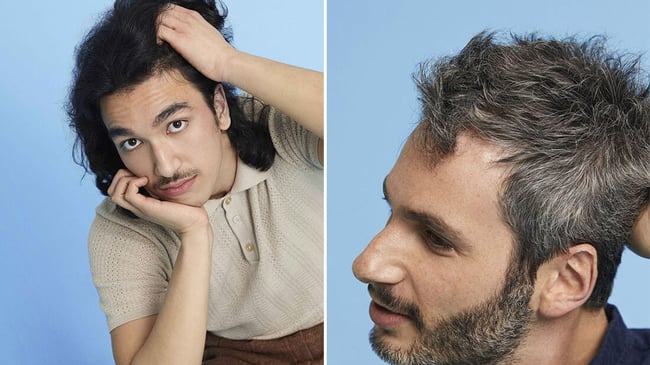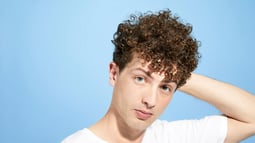

The “no-poo” cure put to the test
Photos Rachelle Simoneau
Words Pauline Allione
Share the article on
During the lockdown, greasy hair is going for the win.
Since the beginning of France’s lockdown, one haircare trend has been finding unparalleled success: the no-poo cure. Intended to regulate the secretion of sebum, naturally hydrating hair and allowing us to space out shampoo use, this natural “treatment” involves not washing your hair for one month. No more, no less. Coupled with daily brushing to help spread oil out over the lengths, it’s the body’s automatic way of nourishing every strand. While rocking a greasy mop at the office or between friends might not be ideal, lockdown has brought the barriers down: at home, greasy hair doesn’t seem so problematic.
Zero washes, but regular brushing and rinsing
Joris had been wanting to test-drive the cure for two years but never found the right time, so jumped at the chance that lockdown offered. He convinced some friends to try the experiment with him, as a way of supporting each other and avoiding the temptation of the shampoo bottle. “I wear a shower cap to avoid wetting my hair, and brush it morning and evening with a boar-bristle brush. I braid it at night so it doesn’t move too much.” explains the Strasbourg native. The result? Greasy hair, as one might imagine. “From the fifth day it started to get greasy. On the sixth day it was very greasy. Seventh day? Very, very greasy. After one week, my head started to itch.” He allowed himself one rinse per week, which helped calm the irritation and keep going, headfirst, towards his one month goal.
“I’m actually quite surprised, because I thought it would be worse”, says Maël, after a week of avoiding shampoos. Communications Manager for an environmental NGO, he replaced his routine with a daily rinse, and combing his hair every morning and every evening. He has a theory: “I feel like there a quite a few hairs on the comb, but I think that since they’re greasy, they just don’t fall out during the day.” He is also making the most of his no-poo cure to try out some new hairstyles. “I’m rediscovering the greasy hair effect, and it’s allowing me to try styles I couldn’t try before. It’s like a natural hair gel effect.”
“I felt like the gross guy in the group”
Brandon found the hair gel effect created by the sebum much less appealing, and now he’s never without his cap, whatever the time of day. It’s also why he hasn’t been able to sign up to the full month-long cure: used to shampooing his hair every day, two weeks shampoo-free proved enough of a trial for the Marketing Assistant. A few days after the end of his cure, he’s mostly positive. ”My hair is much softer to the touch and I have the impression that they get greasier much more slowly.” But whereas the lockdown has proved perfect for some, not so much for him. “I was really uncomfortable around my flatmate who was still washing his hair. Every evening at 18:00 we have a drink with our neighbours — balcony to balcony — and we’re quite a big group. I felt like the gross guy in the group, it really bothered me.” Since going back to regular shampoos, “I feel great again.”
“I’ve never had as many compliments!”
Maël, Joris and Brandon might not have finished the month without shampoo, but Théau did. Working from home for a few weeks after an operation, he made the most of the time and tried the cure. “Now, I wash my hair no more than twice a week,” he says, even though before he was also a daily shampoo guy. “My hair has more volume, it’s shinier, and it’s livelier”, he says, “I don’t have Beyonce hair just yet, but I’ve never had as many compliments!”.
Despite the positive effects, Isabelle Gallay, dermatologist and Vice President of the Syndicat des Dermatologues-Vénérologues (SNDV) has some reservations regarding excess sebum. “Not everyone is suited to the cure, as some people secrete more sebum than others, and so need to wash their hair the remove the excess. A scalp that’s saturated with grease risks encouraging bacterial growth.” In this case, the scalp starts to itch and dandruff forms...less than sexy. But spacing out shampoos isn’t necessarily a bad idea, Dr Gallay adds: “If you break the secretion of sebum too often by drying out the scalp, the sebaceous glands start working overtime. It’s a vicious circle. So reducing shampoos to once a week or every ten days could help.”
Lockdown and no-poo: a bad partnership?
With the government encouraging us to respect social distancing and strict hygiene levels, boycotting shampoos right now might not be the best idea, according to some health professionals. “We are advised to wash our hands frequently, and to avoid touching our faces. But many people also touch their hair: can you imagine the consequences if people stop washing their hair for a month?”, asks Laurence Coiffard, doctorate in Pharmacy, in a recent Huffington Post piece.
So whilst the no-poo cure might not be a problem for anyone staying inside, shopping or going out for fresh air changes the situation. The French daily 20 Minutes asked a doctor known as Dermato Drey, who offered two potential solutions: “Viral particles can settle in the hair and stay there for several hours. So touching the hair and then touching the face poses a risk of contracting the virus. It’s better to wash it regularly, or at least cover your head completely when leaving the house”, he explains.
So, if you feel like joining the greasy hair club give the cure a try, but be sure to follow these precautions. They’ve never been more essential.

